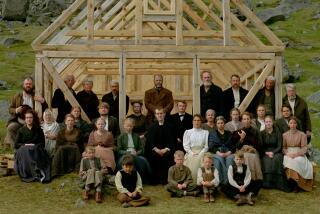Death and disillusionment in Latvia mark ‘Blizzard of Souls’
If anyone needs a reminder of what else — besides a pandemic — has accurately been labeled hell, the grimy, bloody Latvian World War I saga “Blizzard of Souls” is ready and waiting.
A full-throttled adaptation of Aleksandrs Grins’ semi-autobiographical 1922 novel — drawn from his experiences as a teenage infantryman slogging through battles that decimated his country yet led to its independence — “Blizzard of Souls” leans heavily into the hard realities of combat. But even in its crunchy directness, one can detect the familiar ways that war movies have turned long-forgotten sacrifices into an easily stirred patriotism.
It’s not surprising then that in its mix of harrowing action and nationalistic spirit, Dzintars Dreibergs’ muscular, large-scale filmmaking debut — co-written with Boris Frumin — has not only become Latvia’s biggest box office hit since its renewed independence in 1991, but is now the Baltic country’s official entry for the 2021 international feature Academy Award. (After the recent success of Peter Jackson’s “They Shall Not Grow Old” and Sam Mendes’ “1917,” the Great War is certainly getting its share of high-end filmic treatments.)
The movie’s young protagonist is Arturs (Oto Brantevics), a fresh-faced lad of 16 when the 1915 German advance on Russia violently upends his family’s farm home, turning him into one of the thousands of displaced persons. After a battalion of Latvian riflemen is created to fight for the tsar and their own ravaged homeland — a hint of the muddled loyalties that would eventually foment a desire for self-rule — Arturs is conscripted along with his older brother Edgars (Raimonds Celms) and dad (Mārtiņŝ Vilsons), a fired-up marksman who is eager to make a warrior out of his youngest.
Initially training with fake guns and grenades, Arturs warms to the camaraderie of fellow soldiers and the sense of importance (and appeal to the opposite sex) that comes with a uniform. But he grows up quickly when introduced to the muck, haze and chaos of real trench warfare, the strange new threat posed by flying machines that can rain bullets, and the shock of knowing anybody can be felled by a bullet or bomb any second.
The approach Dreibergs and cinematographer Valdis Celmiņŝ take to combat scenes is to treat them like first-person bedlam, simultaneously frenzied and onerous as a daily battle against cold-ravaged terrain, nerves, whizzing death and the enemy. The movie is less interested in the sweep and swoop of a war yarn than the accumulating, on-the-ground details that keep things disorienting and horrible: bleeding ears after a nearby blast; losing your sense of direction; a tangle of sleeping soldiers moaning and shaking through night terrors; needing to halt momentum at the barricade so you can bayonet ice to create footholds; even the hospital humor of flirting with a kindly nurse (Greta Trusina) by blowing cigarette smoke through a bullet hole in the neck.
When the war shifts after the German defeat to the newly installed Soviets’ campaign against Latvians seeking independence, Arturs gets another education in why people fight, which fights matter, and what kind of maturity and resolve is needed to keep it up. It would have made for a stronger final section if Arturs seemed less like a stand-in for a beleaguered nation than a flesh-and-blood character. Nothing against Brantevics, though, who does well with curdling innocence and at the end effectively looks like a hardened version of his first-act self.
Even with a thinly drawn lead, “Blizzard of Souls” maintains an undeniably raw power as a small country’s coming-of-age story, told through a bright-eyed wannabe hero and forged in a maelstrom of death and disillusionment. It may not be the easiest watching at a time when our own country is grappling with the toxic form of patriotism. But Latvia’s struggle has inspired a solidly realistic entry in the war film canon, one that fittingly honors Aleksandrs Grins’ testimony of living through one era of humanity at its worst. Tragically the author didn’t survive the next — following Stalin’s invasion of Latvia two decades later, he was killed in a Soviet prison in 1941.
'Blizzard of Souls'
In Latvian with English subtitles
Not rated
Running time: 2 hours, 3 minutes
Playing: Available Jan. 8 via virtual cinemas, including Laemmle Theatres
More to Read
Only good movies
Get the Indie Focus newsletter, Mark Olsen's weekly guide to the world of cinema.
You may occasionally receive promotional content from the Los Angeles Times.










